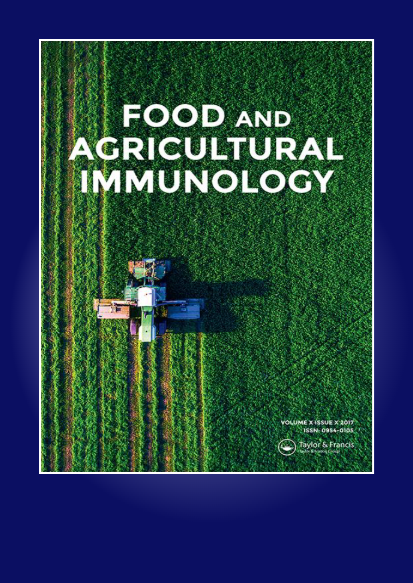Rapid screening of 15 highly toxic pesticide residues in Angelica sinensis decoctions by thermal desorption electrospray ionization mass spectrometry
IF 2.1
3区 农林科学
Q3 CHEMISTRY, APPLIED
引用次数: 0
Abstract
ABSTRACT A decoction is the most common form of Chinese herbal medicine dosing. An Angelica sinensis decoction was qualitatively and semi-quantitatively analyzed for 15 highly toxic pesticide residues by thermal desorption electrospray ionization mass spectrometry (TD-ESI/MS) with a triple quadrupole mass spectrometer in multiple reaction monitoring mode without pretreatment. The instrument response was optimal and sensitivity was highest with the following parameters: thermal desorption temperature, 300 °C; 0.1% formic acid aqueous solution-methanol (1:1,V:V) solvent; syringe pump flow rate, 150 μL/h; and sampler length, 5 cm. Good linearity was attained within the appropriate linear range with the detection limits ranging from 0.01–0.05 mg/L. The same positive sample was verified for QuEChERS pretreatment coupled with liquid chromatography tandem mass spectrometry, showing good agreement with TD-ESI/MS. The newly developed method was demonstrated to be a rapid, green, and efficient analytical method for screening 15 highly toxic pesticide residues in Angelica sinensis decoctions.热解吸电喷雾质谱法快速筛选当归煎液中15种剧毒农药残留
摘要煎剂是中草药最常见的给药形式。采用三重四极杆质谱仪在多反应监测模式下对当归汤中15种剧毒农药残留进行了定性和半定量分析。仪器响应最佳,灵敏度最高,参数如下:热解吸温度,300°C;0.1%甲酸水溶液-甲醇(1:1,V:V)溶剂;注射泵流量,150μL/h;和采样器长度,5 cm。在适当的线性范围内获得了良好的线性,检测限在0.01–0.05之间 mg/L。QuEChERS预处理与液相色谱-串联质谱联用验证了相同的阳性样品,显示出与TD-ESI/MS的良好一致性。该方法是一种快速、绿色、高效的当归药材中15种剧毒农药残留的检测方法。
本文章由计算机程序翻译,如有差异,请以英文原文为准。
求助全文
约1分钟内获得全文
求助全文
来源期刊

Food and Agricultural Immunology
农林科学-毒理学
CiteScore
5.30
自引率
6.70%
发文量
52
审稿时长
2 months
期刊介绍:
Food and Agricultural Immunology is an international open access journal publishing original immunological research with applications in food, agricultural, environmental and veterinary science. Submissions describing the use of immunological techniques and methods are particularly welcomed.
The journal aims to expand our understanding of the interactions at the interface of food and immune systems including studies on:
-Development of diagnostic systems – all types of ligand-based assays, e.g. antibody, aptamer
-Application of ligand-based assays for the detection or identification of molecules of interest in food science, agricultural research, veterinary investigations and clinical systems relating to food allergy or sensitivity to agricultural chemicals
-Effects of food on the immune system
-Studies on allergy and allergic reactions
-Investigations into food allergies
-Development of allergen-free food systems
-Development of novel assay formats
-Applications of assay systems to the monitoring of food items in relation to safety and labelling
-Food quality issues, e.g. speciation, adulteration and contamination
-Comparisons between different analytical techniques
The journal publishes research and review articles and is essential reading for food scientists, immunologists and all those concerned with the interaction between food and immune systems.
 求助内容:
求助内容: 应助结果提醒方式:
应助结果提醒方式:


